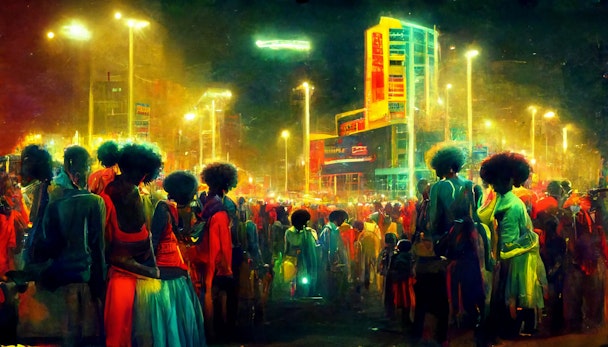With Black Panther: Wakanda Forever making headlines, are brands ready to build Black futures?
Visions of the past are often mired in oppressive stereotypes – it’s up to us to define the future of Blackness, writes Stagwell communications director Brandon Dixon.

The genre of Afrofuturism explores futures of Black culture that are free from racist stereotypes. / Adobe Stock
As Black Panther: Wakanda Forever dominates the end-of-2022 box office, my question for brands for 2023 is: "How long until Black Futures Month?" Brands feasted at the marketing table for the Black Panther sequel — with good reason. Fifty-two percent of Black American consumers selected the original film as being among the "best examples of representation and inclusion in American entertainment” in a 2020 National Research Group study. But by and large, we still rely too heavily on Black History Month (which runs concurrently with Black Futures Month) as the main opportunity to elevate stories built for Black consumers. The success of Black Panther: Wakanda Forever shows we should look forward, not just back, in our future marketing efforts.
I'm borrowing my question about Black Futures Month from a 2018 short story collection from Hugo award-winning Black speculative fiction writer N.K. Jemisin's with a similar title. Speculative fiction and Afrofuturism are powerful genres that can fuel expansive new creative marketing territory for today's brands, especially as they play in sci-fi-inflected worlds like web3. By reaching into the future, marketers can create more complex visions of Black representation that resonate with global Black consumers.
Advertisement
Afrofuturism, for the uninitiated, is a genre that challenges the creation of Black Futures unshackled from historical racism. It asks its participants to go beyond visions constructed from the past to think, experience, and hear what Blackness might look like on the other side of the horizon. Science and technology loom large in its aesthetic; the genre is often intergalactic. Look to the beyond-this-world vibes of Sun Ra, Erykah Badu and Janelle Monae for inspiration.
There is a rich universe of content and inspiration to draw from, as Black Panther: Wakanda Forever proves. The brands that want to connect meaningfully with an ever-more-global and ever-more-digital set of Black consumers should focus on helping consumers see themselves in the future-scapes that brand entertainment can create.
Future representation
Ninety-one percent of consumers are confident in the ability of media to influence society, per the 2020 National Research Group study cited above. As brands blur the line between Hollywood and Madison Avenue with branded entertainment, future-leaning visions are the way forward to connect meaningfully with Black consumers.
Brands that invest in sci-fi, fantasy, or superhero genres as they build entertainment can tap into a potential gold rush. In addition to Black Panther, several Black American respondents to the 2020 National Research Group study selected Black Lightning – CW's landmark Black superhero show – as being among the "best examples" of popular American media productions that authentically and realistically depict Black characters. Both Black Panther and Black Lightning signal the potential growth in futuristic, fantastical and out-of-the-box genres that bring speculative Blackness to the masses: According to the National Research Group study, 77% of consumers find Black content in a futuristic setting appealing – that number jumps to 85% among Black Americans.
While more Black characters and stories exist in mainstream media than ever, consumers still need more authentic, positive, and complex visualizations of Black people. Black characters representing negative stereotypes remain the top pain point among 91% of Black Americans. Brands can subvert those narratives through speculative fiction and Afrofuturism, helping consumers see Black characters in new contexts.
Advertisement
Brand creativity that only mines the past for visions of Blackness may dwell on traumatic storylines. Joy exists in the past, but clumsy brand storytelling often leads to the platforming of the same recurring stories about Black oppression. If brands can build Afrofuturist narratives in concert with Black creatives and think expansively about the potential forms Blackness might take in the future, we'll see more stories of Black joy and transcendence enter the mainstream.
Box office numbers and sponsorships dollars around Black Panther: Wakanda Forever make it clear: Black Futures are a growth area for brands. The exciting part about the future? It is a collaborative construction. As a brand leader, your role in that collaboration is to invest, platform, and consider a different approach to intersecting Black identity and brand communications. You'll need copywriters', designers', and strategists' rooms that reflect the mosaic of the global communities you're trying to reach.
So ask yourself: Wakanda future do you imagine in 2023?
Suggested newsletters for you
Brandon Dixon is director of communications at Stagwell.
For more, sign up for The Drum’s daily US newsletter here.
